Tag: politics
Gendered Violence: Domestic Abuse and Gun Ownership
by Christina Charie '25 on February 16, 2023
Opinion Editor
Featured Slider
With mass shootings on the rise once again, inaction still runs rampant within the American legal system. Recently the Fifth Circuit Court of Appeals released a new decision that will allow domestic abusers to own guns. Even though domestic abuse situations are closely tied to mass shootings, courts continue to uphold gun rights at the cost of human lives. Upon closer analysis, one must realize that allowing domestic abusers to legally own a firearm will have a disproportionate impact on women.
While one in nine men experience partner violence, domestic violence impacts women at a rate of 25 percent according to the National Coalition Against Domestic Violence. The new ruling from the Court of Appeals has consequences that will impact more women than men in America, which is often left out of headlines. The law continues to insinuate that women’s safety is less important than men’s right to own a gun. Women are not truly equal to men if such a ruling is considered constitutional.
The Appeals Court ruling not only allows domestic abusers to legally own a gun; but those with a restraining order against them also have a pathway to legal gun ownership. Any law that prevents domestic abusers from owning a firearm is unconstitutional according to the court’s interpretation of the Constitution. However, according to the National Coalition Against Domestic Violence, the risk of homicide increases by 500 percent when a gun is present in a domestic violence situation.
The victim’s life should take precedence, but the American legal system casts them aside. This allows them to be sacrificed in the name of the Second Amendment before considering that a document written in 1789 might need reforms. Instead, survivors are forced to live in fear before the government will seize guns from a citizen.
While the ruling only applies to Texas, Louisiana, and Mississippi, court decisions have the power to set far-reaching precedents. If challenges to the ruling reach the Supreme Court, a decision could require that all states guarantee that domestic abusers have the right to firearm ownership. Ultimately, this decision sustains a culture of silence surrounding domestic violence as victims will fear for their lives when reporting abuse, which may even deter survivors from informing law enforcement altogether.
Any solution to gun violence must take into consideration how women are neglected in the name of American exceptionalism. Despite the gendered nature of gun violence, people of all identities will face the consequences of silence. Domestic violence is traumatic on its own; the last thing survivors need is the constant fear of gun violence as well.
Rhode Island’s 2nd Congressional District Election: Seth Magaziner vs. Allan Fung
by Sarah McLaughlin '23 on October 29, 2022
Editor-in-Chief
National and Global News
by Sarah McLaughlin ’23
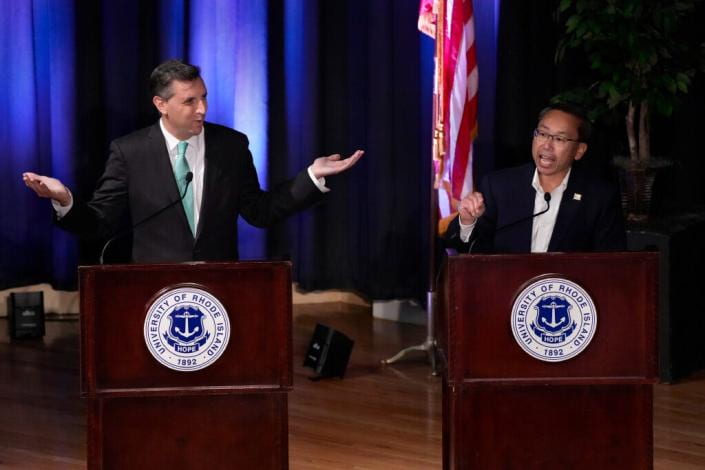
With Congressman Jim Langevin not seeking re-election, the Rhode Island 2nd Congressional District seat is up for grabs this election season. The Providence College campus, as well as the surrounding off-campus neighborhood, is a part of this district, which spans from western Providence to the northwestern, southwestern, and southeastern reaches of the state.
Democrat Seth Magaziner and Republican Allan Fung are the two leading opponents for the seat. Magaziner is the current Rhode Island General Treasurer, has a teaching background, and is a graduate of both Brown University and Yale University. Fung has served as the current mayor of Cranston since 2008, has a law background, and is a graduate of Rhode Island College and Suffolk University Law School. Both candidates have previously run for governor and were unsuccessful. Magaziner originally began this year’s election season with a bid for governor, announcing his candidacy in September 2021. In January, he changed course for Congress.
Magaziner states that he “is running for Congress to fight for the middle class and those working hard to join it.” He pledges to protect Social Security and the Affordable Care Act (Obamacare), lower the price of prescription drugs, and lower gas prices by returning the profits of big oil companies to consumers. He has stated he supports suspending the federal gas tax. Magaziner is pro-choice; he helped pass the Reproductive Privacy Act, which codified Roe v. Wade into Rhode Island state law. He has also initiated clean energy programs as the state’s treasurer. Magaziner has received the endorsement of current Congressman Langevin.
Fung also pledges that he will lower the cost of living and gas prices. He argues that the U.S. should not be dependent on imported oil and that we should instead increase domestic oil production. He has stated that he is in favor of completing undrilled oil wells. Fung also states that concerning energy, he is “laser-focused on bringing new approaches…to the table that protect working families’ paychecks while also preserving our environment for years to come.” He believes that renewable energy brings an opportunity to create jobs in Rhode Island, stating, “Let’s take the debate over climate solutions out of the political arena and put [it] into the paycheck arena.” On the issue of abortion, Fung’s views are unclear. In 2018, he said he supported “a woman’s right to make medical decisions,” with some restrictions. If he wins, Fung would be the first nonwhite representative of Rhode Island in Congress.
The two candidates went head-to-head in two debates this week. The first debate took place on Monday, Oct. 17 at the URI Kingston campus. It also featured independent candidate Bill Gilbert, who is currently polling at about 5 percent.
Among other topics discussed were the events of January 6, 2021. “January 6 was a very dark day in our country’s history, and I spoke out on that day,” Fung stated, likely in an attempt to differentiate himself from the Republicans who supported the events. “I’m not President Trump,” he said. “I don’t act that way. I’m not about divisiveness.” However, Magaziner pointed out that Fung has “made clear” that he would vote to “put election deniers in charge of the House,” citing his support of Kevin McCarthy and Jim Jordan. Fung argued that Magaziner’s support of Nancy Pelosi is a larger issue, believing that her actions have “crippled the economy.”
I spoke with Dr. Cammarano of the PC Political Science Department about his thoughts on the debate. “This is a year where both sides are trying to say they’re not like the typical person in their party,” he said. “The reality is they’re both going to vote with their party.”
Magaziner also spoke on how he supports lowering interest rates for student loans so students can focus on pursuing their desired careers after graduation. Fung agreed that he would support lowering the interest rates, and he also stated he would support “doubling the amount of Pell grants” awarded.
On the topic of abortion, Magaziner stated, “There’s no ambiguity about where I am.” He argued that Fung, on the other hand, has gone back and forth on the issue. Fung pushed back, stating that he has made clear his opposition to a national abortion ban.
Independent candidate Bill Gilbert, who has thus far run a very low-profile campaign, spoke on how he believes “hyperpartisanship” is a major issue dividing the country. “We’re still running against Trump, and he’s not in office,” he stated. “We need to heal.” He also argued in favor of public funding for STEM fields and vocational training.
The second debate took place on Tuesday, Oct. 18 at Providence Performing Arts Center. Issues on which the two candidates agreed include federal legalization of marijuana, federal protection of same-sex marriage, and instituting term limits for both Supreme Court justies and congresspeople.
According to Suffolk University and Boston Globe polling data from Oct. 12, Fung leads Magaziner 45 percent to 37 percent. 13 percent of voters remain undecided. David Paleologos, director of the Suffolk University Political Research Center, stated, “Fung has a lead in this race due to overwhelming support from men, independents, and older voters.” Meanwhile, Rhode Island Governor Dan McKee, a Democrat, leads Republican challenger Ashley Kalus 46 percent to 36 percent. Paleologos believes independent voters are responsible in both cases. Fung and McKee both have a hold over independents.
Polling data from Fleming & Associates gives Fung a 6-point lead, while data from the Mellman Group gives Fung a 3-point lead. Despite the polling data it cites, FiveThirtyEight still judges the race in favor of Magaziner; the analysts give him a 55 percent chance of winning as of Oct. 17. However, as Dr. Cammarano pointed out, the margin of error is about 6 points. “We just don’t know what’s going on,” he said. “I would still say Magaziner has an edge, but he has a certain vulnerability.” Dr. Cammarano noted how while Magaziner only recently moved to his district, Fung has lived in and governed Cranston for years.
While Inside Elections with Nathan L. Gonzales and Larry J. Sabato’s Crystal Ball categorize the race as one that leans democratic, The Cook Political Report rates it as a toss-up. This seat could be up for grabs for either candidate. The House could potentially swing in favor of the Republicans depending on how many of these toss-up seats they win.
Rhode Island is generally thought of as a deep blue state, but the more rural parts of this district have the potential to vote red. “If water is touching a town, it tends to be Democratic,” Dr. Cammarano stated. Biden won all five counties in the 2020 election, as did Democratic Senator John Reed. However, while Biden saw large margins of victory in the coastal cities like Providence, Warwick, Newport, and Narragansett, he lost many of the inland towns, such as Burrillville, Glocester, Scituate, and Foster, all of which are a part of the state’s 2nd Congressional District. Thus, the race could truly go either way.
If you are registered to vote in Rhode Island, remember that your vote counts. Election Day is Tuesday, November 8, and the polls will be open from 7 a.m. to 8 p.m.
PC Dads in Politics Speak on Upcoming Election: College Hosts Chris Christie ’23P and Michael Dukakis ’23GP
by The Cowl Editor on October 15, 2020
Campus
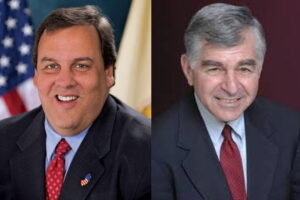
by Eileen Cooney ’23
News Staff
On Thursday, Oct. 1, Providence College hosted a Friar Forum with two former governors and presidential candidates, Chris Christie ’23P and Michael Dukakis ’23GP. Christie and Dukakis answered questions about the upcoming election and shared stories about their careers in public service.
The event, moderated by political science department chair Dr. Joseph Cammarano and senior political science major Julia Murphy ’21, was extremely popular with over 700 students, parents, faculty, and alumni in attendance.
Murphy opened the forum by asking the two former governors, “What drew you to public service, and what made you stay so long?” Both Christie and Dukakis answered with detailed, personal anecdotes about their early childhood and adolescence.
Dukakis, growing up in Brookline, MA at a time when people of color were barred from living in his neighborhood, listened to the CBS World News Roundup every night on the radio, and grew interested in solving the injustices he observed in his immediate surroundings. He says that he never regretted his decision to serve in the public sector, and he emphatically claimed, “to be able to make a difference in the lives of your fellow citizens, there is nothing like it.”
Similar to Dukakis, Christie said his interest in public service came at a young age. He told stories of being six years old and watching the Democratic National Convention with his grandmother and of being a teenager volunteering on Tom Kean’s 1977 campaign for the Republican nomination for the governor of New Jersey.
Dukakis and Christie, who both have extensive experience in bridging partisan division, were asked how current political leaders can work effectively with opposing ideas or individuals.
Christie stressed the importance of generating strong personal relationships with others above all else. He feels that the largest problem in Washington, D.C. today is the lack of interaction between politicians; they do not engage with one another long enough to foster personal trust. “It’s much harder to hate up close,” he says. That is why personal relationships make all the difference. Similarly, Dukakis emphasized the importance of inviting leaders on both sides to work together to solve problems and develop policy.
While bipartisanship is surely a big issue, so is the lack of democratic participation among young people. Thus, Murphy asked Christie and Dukakis what passionate young people should do to get involved.
Both responded by emphasizing that we have a political system that allows for people of all backgrounds to come forward and speak their minds. They highlighted the importance of young millennials and Generation Z kids just showing up, displaying their talent, and working hard to make their voices heard.
In addition to questions asked by the moderators, Dukakis and Christie also answered questions from the audience about the current executive administration’s COVID-19 response, the recent nomination of a Supreme Court Justice, and how one can ensure that our democratic institutions are not weakened.
Murphy says that “co-moderating the Friar Forum was a great experience, as it was really remarkable to see Governor Dukakis and Governor Christie, who fall on opposite sides of the political aisle, come together to share stories and insight about the importance of public service.” Coming away from the event, Murphy says that she hopes “people watching saw this as an example of how we can work together despite our differences and to take the time to get to know people we do not always agree with.”
Election of 2020: South Carolina Primaries and Super Tuesday Results
by The Cowl Editor on March 5, 2020
National and Global News

by Nicole Silverio ’22 and Kyle Burgess ’21
News Staff
Over the past several days, results from South Carolina’s primary elections and Super Tuesday have created major developments for the upcoming decision of choosing a Democratic nominee.
Earning 39 delegates and nearly 50 percent of the vote, former Vice President Joe Biden and his campaign celebrated a major win in South Carolina over the weekend, resetting the entire race.
On Saturday, February 29, South Carolina held its Democratic presidential primary where Biden won a major victory, sparking hope for his campaign. Currently with 54 delegates, Biden was almost tied with Senator Bernie Sanders who had 58 delegates, threatening Sanders’ spot as frontrunner.
With 54 delegates at stake in South Carolina, Biden achieved immediate success by earning 20 delegates with only one percent of the vote being reported. Prior to South Carolina, Biden had only obtained 15 delegates after having minimal success in Iowa, New Hampshire, and Nevada, but the results in South Carolina had rescued his campaign.
Biden’s overwhelming support amongst black voters determined his victory, winning around three in five black voters. Two-thirds of voters over the age of 65 supported Biden.
With South Carolina’s large African- American population, Biden gained support for being Barack Obama’s vice president, who is beloved by a majority of black voters in the state. One resident of Columbia stated, “He was Obama’s vice president and he stuck by him.”
According to exit polls, 56 percent of the Democratic electorate was African American, adding to the significance of Biden’s support amongst black voters in the state. A Fox News voter analysis found that Biden is the highest rated Democratic candidate on who can best handle race issues, attaining 38 percent.
According to CNN, the favorable numbers amongst candidates in South Carolina overwhelmingly leaned towards Biden. According to the poll, 76 percent found Biden a favorable candidate with only 20 percent finding Biden to be unfavorable. Meanwhile only 53 percent favored Sanders, with the remaining 41 percent finding Sanders unfavorable. In regards to Mayor Michael Bloomberg, 26 percent of South Carolina voters found him to be favorable while 66 percent consider him unfavorable.
After Biden’s victory, other candidates began to lose hope in their presidential campaigns. That night, as Biden gave his victory speech, businessman Tom Steyer dropped out of the race. On the following day, Mayor Pete Buttigieg announced the end of his presidential bid. Senator Amy Klobuchar also dropped out of the race. Both Buttigieg and Klobuchar have following backed Biden since the results in South Carolina.
The former vice president’s success in the Palmetto State was mirrored across the South and elsewhere following the results of Super Tuesday. Biden carried Alabama, Arkansas, Maine, Minnesota, North Carolina, Oklahoma, Tennessee, Virginia, and was even able to upset Senator Elizabeth Warren in her native Massachusetts. Not to be outdone, Senator Bernie Sanders captured the biggest prize of the night in the California primaries, coupled with his victories in Colorado, Utah, and Vermont.
These most recent results have effectively made it a two-horse race for the Democratic presidential nomination between Biden and Sanders. Following his inability to “get it done” at the polls, former NYC Mayor Michael Bloomberg announced his withdrawal from the Democratic contest with Elizabeth Warren likely to follow suit. Such concessions would follow in the footsteps of billionaire Tom Steyer, Klobuchar, and Buttigieg.
Around the Political Horn: PC Professors Weigh in on Current Political Events
by The Cowl Editor on February 13, 2020
Campus
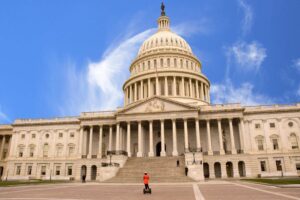
by Nicole Silverio ’22
News Staff
Last Wednesday, February 5, five professors from the political science department, Dr. Bill Hudson, Dr. Joseph Cammarano, Dr. Paul Herron, Dr. Adam Myers, and Dr. Matthew Guardino, held a panel discussion in the Arthur F. and Patricia Ryan School of Business discussing contemporary politics in the past week.
This week has shaped American politics with the start of the Democratic primary and caucus elections, the presidential impeachment trial, and the State of the Union Address, which took place the night before the panel.
The first topics of discussion were the articles of impeachment, in which President Donald Trump was officially acquitted by the Senate. Only one Republican senator, Mitt Romney, voted to convict President Trump.
Dr. Hudson made the claim that Trump was not cooperating with Congress. He then cited a book published in the 1970s titled The Imperial Presidency which discussed the impeachment of former President Richard Nixon. Nixon allowed witnesses to testify in his trial, unlike the current president.
“Trump has not been forthcoming in providing information. This administration would not participate in the impeachment at all. Nine witnesses called to testify refused to appear,” said Hudson. “There’s going to be more stonewalling from the Trump administration which may depend on court cases that may come up.”
After the discussion on impeachment, a long discussion arose on the State of the Union Address, in which President Trump spoke before Congress, Supreme Court justices, and the American people, addressing the progress made in this country.
Dr. Myers stated that historically, “The State of the Union Address was not public until Woodrow Wilson’s presidency. The reasoning for this was the fear of demagoguery. Meyers says, “We should go back to the way it was in the 19th century, where the President submitted a letter to his Cabinet and Congress. The current State of the Union is a ridiculous tradition.”
Dr. Cammarano added, “We have to acknowledge that Trump has done a lot of what he said he would do in 2016. However, I have been studying politics for several years and this State of the Union made me not want to study politics anymore since it was a classic example of what politics has become. It has become political professional wrestling. What we’re seeing is not politics, it’s political wrestling.”
What he was referring to was the tension between President Trump and Speaker Nancy Pelosi, who visibly tore Trump’s speech on camera. After, Trump refused to shake her hand.
In regards to Trump’s claims in the State of the Union, Dr. Guardino said, “Last night was an object lesson not only to fact check but to critically evaluate claims in context. The economy is doing well largely due to many grassroot movements, which has led to states across the nation increasing their minimum wages, which the Trump administration has opposed doing.” President Trump’s accomplishments may have been embellished or have happened without his involvement.
Dr. Hudson mentioned that Trump is “a very clever showman and administered that in the State of the Union. It’s in Trump’s best interest to be the kind of showman that he is when he talks to the press in order to get reelected.”
On the topic of the recent conflicts between political parties, the professors talked about how fifty years ago, political parties were weaker, causing differences in opinions to have less of an impact on legislation.
“Up until the 70s, we did not have strong political parties,” said Myers. “When we have strong parties like we do today the system breaks down.” Cammarano added, “I want weaker parties and for Republicans and Democrats to focus on the common interest of the people.” In today’s political climate, it is difficult for people with different political views to understand others opinions, which reflects how the parties treat one another in Congress.
In today’s polarizing political climate, the political science department wants students to understand what is currently unfolding in politics because, as Cammarano put it, “the young people are going to be the ones to have to fix the major issues in today’s politics, and it is essential to get today’s youth involved in political events in order to make significant changes needed in today’s crazy political climate.”
Election of 2020: Iowa Caucuses Begin 2020 Election Season
by The Cowl Editor on February 6, 2020
National and Global News
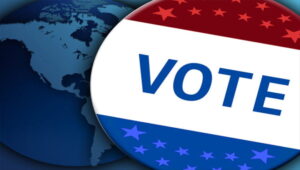
by Maura Campbell ’22
News Staff
Candidates for the upcoming presidential election are making their last-minute campaign pushes as the early primaries begin. The Iowa caucuses to select the Democratic presidential nominee were held on Monday, February 3.
Reporting on the results of these caucuses has caused unusual controversy, as there were inconsistencies with the counting which continued into Tuesday. Current standings, with 71 percent of precincts reporting as of Tuesday afternoon, show Pete Buttigieg leading the polls for the Democratic Party, followed closely by Bernie Sanders.
According to the Iowa Democratic Party, the issue was not caused by any form of hack or intrusion, but rather by a reporting error with a new app used for calculations in the caucuses. Mandy McClure, director of communications for the Iowa Democratic Party, stated on Monday night, “The underlying data and paper trail is sound and will simply take time to further report the results.” Despite the early lack of results, several candidates gave victory-like speeches on Monday night.
Early primaries and caucuses are particularly important for candidates because they often provide an indication of how well a candidate will do in later primaries. Primaries to select the Democratic and Republican nominees for president begin in February and last through June, with the most important voting date being March 3, 2020.
On this day, known as Super Tuesday, the states of Alabama, Arkansas, California, Colorado, Maine, Massachusetts, Minnesota, North Carolina, Oklahoma, Tennessee, Texas, Utah, Vermont, and Virginia all hold their primaries.
Meanwhile, with President Trump’s impeachment trial coming to a close, the American public seems to be largely divided as to whether the Senate should remove Trump from office.
According to an NBC/Wall Street Journal poll released on Sunday, February 2, the majority of Americans do believe that the President is guilty of both articles of impeachment: abuse of power and obstructing Congress. However, public opinion is split along party lines as to whether these actions warrant his removal from office.
This opinion has stayed fairly consistent throughout the course of the trial. This new poll reports that 46 percent of registered voters support removing Trump from office while 49 percent do not; virtually unchanged from the even 48-to-48 percent ratio on the same question reported by NBC/Wall Street Journal’s December poll.
For non-registered voters, it is important to register as soon as possible in order to be able to cast a vote in your state’s primary election. Although many states allow for online voter registration, there are still several states that do not, meaning that registration may have different requirements. For information on how to register or how to vote in your home state with an absentee ballot, call your local town office or visit www.vote.org.
Election of 2020: Impeachment Trial Goes to the Senate
by Kyle Burgess on January 30, 2020
National and Global News

by Nicole Silverio ’22
This week, opening arguments began in the Senate regarding the House of Representatives’ impeachment of President Donald Trump. Both Democrats and Republicans have spent the last week making their case of whether r not to remove President Trump. After both sides has the opportunity to ask questions, they will vote on whether or not to subpeona witnesses not yet heard in the investigation.
On December 16, 2019, the House Judiciary Committee released a report explaining the charges against the President. The charges against him are abuse of power and obstruction of Congress. The Democratic Party, led by Speaker Nancy Pelosi, has accused President Trump of obstructing justice for contacting the Ukrainian president to investigate his political rival’s son. In October, the Intelligence, the Oversight and Foreign Affairs committees deposed witnesses involved with Ukrainian foreign policy testifying that Trump wanted the Ukrainian president, Volodymyr Zelensky, to publicly announce investigations into Joe Biden’s son, Hunter Biden and Burisma, a Ukrainian natural gas company that Biden had served on the board of until 2019.
On December 18, 2019, the House of Representatives held a trial in which the representatives held hearings, the Democrats supporting impeachment and the Republicans against it. The final vote was largely along party lines, with all Republicans and three Democrats voting against the impeachment, while the majority of Democrats voted for impeachment, officially impeaching the president.
Speaker Pelosi sent the articles of impeachment to the Senate, where senators have been arguing for or against the president. Pelosi has named seven Democratic members of Congress as the managers who will argue for impeachment. “What is at stake here is the Constitution of the United States” said Pelosi during a press conference. According to Tucker Carlson, host of Fox News’ Tucker Carlson Tonight, Senator Chuck Schumer explained that “even with no chance of removing President Trump at the end of the process, impeachment is still absolutely necessary for this country, and every other problem we face must go on hold to pursue it.”
Senate Majority Leader, Mitch McConnell, is setting rules for the chamber to vote on. Democrats have requested witnesses in the trial, but McConnell has refused this request. Republican senators delayed the vote to subpeona witnesses until after arguments have been made.
President Trump reported that he looks forward to having his due process in the Senate, the majority of which is Republican. Republican Senator Roy Blunt of Missouri told CNN, “Our side has not changed our view on this. I think where House Democrats failed, and maybe Senate Democrats failed, were trying to use the time in a way that would wear us out and deny the president’s team any response this week.” Contrary to the senator’s opinion, CNN editor at large, Chris Cillizza, claims that 1 in 3 Republicans (32 percent) believe Trump has committed illegal acts either before or during his presidency. Despite their beliefs, the majority of them are willing to back Trump, believing he should not be removed from office.
Chairman Jerry Nadler accused Republicans of covering up President Trump’s crimes, claims to which the president’s lawyers, Pat Cipollone and Jay Sekulow, retaliated against. He has been accused by several Republican senators as being “especially partisan.” Adam Schiff, one of the impeachment managers, told CNN that “The President late last night bragged that he had the material. Indeed, they do have the material hidden from the American people. That is nothing to brag about. If the senators are serious about wanting to learn all the facts, if the President’s team wants to contest any of the facts, these documents and witnesses will need to be produced.” Democrats, to the dismay of Republicans, are desperately trying to withhold four Republican votes to obtain evidence and witnesses.
Due to the House Democrats’ vote last month, President Trump must endure the 2020 election through his impeachment, and may run against the political rival who he has had investigated. The question open for debate is whether President Trump’s impeachment will harm him or benefit him this upcoming November 3. The American people will either desire to vote an impeached president out of office, or turn their anger towards the Democrats for bringing the impeachment trials to life to begin with, perhaps believing that the impeachment has turned heads away from the real issues facing our nation. Only time will tell.
Election of 2020: Current Standings for Candidates
by The Cowl Editor on January 16, 2020
National and Global News
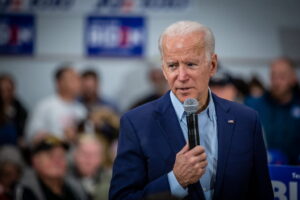
by Alexandra Huzyk ’20
News Staff
The next United States presidential elections are scheduled to take place on Nov. 3, prompting voters to consider a number of diverse candidates. As of January 2020, there are 12 major Democratic candidates, and three major Republican candidates, including incumbent President Donald Trump.
The eighth, ninth, and tenth Democratic primary debates are scheduled to take place throughout February. These debates help to inform voters, promote accountability of elected officials, and progressively narrow down the number of candidates running for the Democratic nomination. Past debates have pressed candidates to address important issues like healthcare, education, gun violence, inequality, and war. The Democratic primary will likely be settled on Super Tuesday—March 3, 2020—“when the largest number of states and territories hold a presidential preference primary or caucus.”
Front-runners for the Democratic nomination currently include Joe Biden, Bernie Sanders, Pete Buttigieg, Elizabeth Warren, and Amy Klobuchar. Many predict Biden will be the nominee for the Democratic Party; having maintained consistently strong African-American support, continuing to receive a multitude of endorsements, and polling the best against President Trump. According to political Analyst Nate Silver, “Should Joe Biden win Iowa, he has an 80 percent chance of becoming the nominee.”
In the wake of these predictions, Sanders has gained momentum within the past months, receiving $34.5 million in the last fundraising quarter and garnering strong support from younger generations and public sector union members. However, Sanders’ democratic socialist views pose an issue for Democrats who think a more politically moderate candidate has a greater chance of winning against President Trump. In addition, many view Sanders’ age (77) and health as potentially problematic.
In the opposing party, candidates who seek to attain the Republican nomination include incumbent President Donald Trump, Joe Walsh, and William F. Weld. Even after having been recently impeached, for abuse of power and obstruction of Congress, President Donald Trump remains the primary Republican presidential candidate. The chances of either Walsh or Weld being granted this nomination are extremely low.
Although presidential approval ratings of Trump have remained notoriously low throughout his time in office, it is reported that he has around a 40% chance of being reelected to office. These chances of reelection may be explained by the decreasing unemployment rate and increasing GDP growth rates, which some attribute to the work of Trump’s presidency.
Historically, 17 of 44 presidents have been reelected for a second term. On the power of incumbency, Aaron David Miller, an academic at the Carnegie Endowment for International Peace, has said, “As President Trump has demonstrated with frightening clarity, presidents dominate the national and media narratives; we see or hear them daily, in Trump’s case often hourly.”
A number of different factors will continue to influence the likelihood of Trump’s reelection, including the upcoming impeachment trial in the Senate and the recently initiated military conflict with Iran.
Pizza and Politics Series Tackles Midterm Elections
by The Cowl Editor on November 15, 2018
Campus
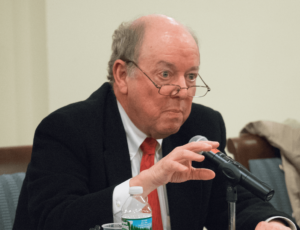
by Kellie Johnson ’22
News Staff
On Tuesday, November 13, the political science department joined with the Board of Programmers (BOP) to hold an event in which people could discuss the results of the 2018 midterm elections over everyone’s favorite comfort food—pizza. This was the second Pizza and Politics event held on campus, and it occurred in the Fiondella Great Room in Ruane.
By the start of the event, almost all of the seats were filled. The chair of the political science department, Dr. Bill Hudson, and political science professor, Dr. Adam Myers led this talk, along with three students, Madison Clark ’19, David Quattrochio ’19 and Rachel Minassian ’19, whom are heavily involved with politics on campus.
The midterm elections themselves happen every two years. It is within them that new representatives are elected to the House of Representatives, and one third of the Senate is elected as well. This event pointed out how this election was especially significant because it had the largest pool of candidates to vote for and a huge spike in youth voter turnout.
It has been an ongoing problem in society to encourage voters from ages 18 to 25 to vote. It was exciting to see such a large turnout for a political event on campus because this further proves the point that the youth is finally using their voice.
One of the seniors on the panel discussed how the election contributed to diversity and a more progressive society. For example, the first Muslim woman was elected to Congress, along with the first ever Native American woman in the House, and the first ever openly gay governor. The election also had a record number of women winning seats. She pointed out that this was very impressive for today’s society.
Myers displayed the results of each election: House, Senate, and Governor.
Overall, the Democrats were greatly succeessful in this election. The exact number of seats taken has not been determined yet, since recounts are still happening in some states.
Dr. Myers brought to our attention an interesting statistic in the elections for the House, in which he noted that some of the wealthiest districts in our country took Democratic seats, calling stereotypes into question.
He called these results a “top and bottom coalition,” due to the fact that the Democratic Party is thought of to be the party which in the past has represented the interests of minority groups, as well as lower class. Yet, when the wealthy voted blue, it put things into perspective.
Another student talked about the politics specific to Rhode Island; there is no doubt that Rhode Island is a Democratic state.
The event held discussion over whether or not Rhode Island will move towards a progressive local government or a more moderate and centrist one.
The prediction was that due to the most recent election, Rhode Island will probably be more moderate in its legislation over the next couple of years.
The Pizza and Politics event left its audience wondering what will happen next. Dr. Hudson discussed different outcomes, and he said that a gridlock is likely to occur in the next year due to the constant dispute of both parties.
Although both parties will likely never completely agree, Dr. Hudson predicted that they will reach resolution over the issue of healthcare.
He also talked about the next six or seven weeks; due to the Republicans losing their power, there is talk of a government shutdown at the beginning of the year due to the potential threat of Congress failing to pass seven appropriations bills by the end of the calendar year. Dr. Hudson said that this is an unlikely occurrence, but that even the president says that a government shutdown could be a good thing.
Finally, Dr. Hudson left an open-ended question causing the audience to think about their own personal opinion. He left us wondering: will Congress include Trump’s famous idea of “the wall” in their budget?
Hopefully, the Pizza and Politics event will continue to occur on campus due to the insightful questions and multiple perspectives that allowedstudents to form their own political opinions.
Each professor and student at the event did an amazing job sharing their ideas without any bias so that everyone in the audience could hear their claims and interpret them individually.
